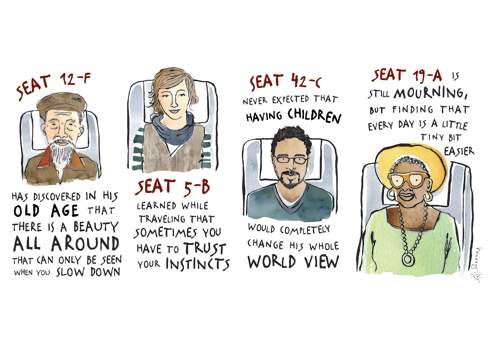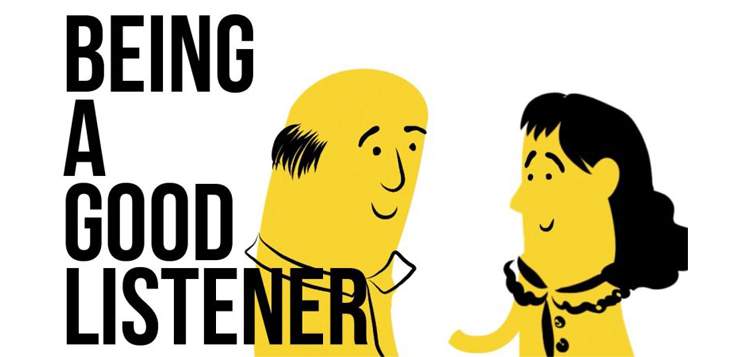Having discovered that talking to a person on a train or a bus or a plane, or even in a supermarket line, often becomes a valuable lesson for me, I am always eager for chances to do it.
I was in a window seat near the front an hour into my flight from San Francisco to New York when a woman standing in the aisle caught my eye and asked, “Would it be all right with you if I came and sat in this empty middle seat for the last half hour of the flight? I’m way at the back.”
“Yes, it’s fine,” I replied, looking over at the man in the aisle seat who acknowledged that he was also agreeable.
“Thanks,” she said. “I’ll be back.”
Four hours later she returned, put her coat into the overhead compartment, and took the middle seat. She thanked me again.
“You’re welcome,” I said. “Why did you want to sit here now, just at the end of the flight?”
“I’m claustrophobic,” she replied. “I am okay in a plane, even way in the back, when everyone is sitting down. When they stop at the gate and everyone stands up and I can’t move at all or even stand up straight, I start to feel very anxious. This way, I’ll just get off as soon as the doors open.”
“I’m glad you asked,” I said, smiling.
“I always do,” she replied. “I’m not embarrassed. Everyone has something. I have claustrophobia.”
“Do you live in New York or are you visiting,” I asked.
“I live in San Francisco. I’m going to my brother-in-law’s funeral. He died the day before yesterday. He and my sister lived in New York. I have three brothers who live there too. My other two sisters live in California near me. They’re in the back of the plane.”
“I’m glad you have such a big family,” I said. “Times like these it’s important.”
“We are seven siblings now,” she continued, “but my mother had eight children. Those days, Irish Catholics, we had big families. My eldest brother was killed in the war in the Pacific when he was seventeen. Jim knew if he waited until he was eighteen he’d be drafted, and he wanted to be in the navy, not the army, because he wanted to sleep in a warm bed. Funny what you remember so many years later. I was five years old.”
“Who took it harder, your mother or your father?”
“It was terrible for both of them. I think they never got over it.” She sat quietly for some moments. Then she said, “When we got older, my sisters and brothers and I made a foundation that pays for talented students in some of the small Solomon Islands to go to high school in Guadalcanal. Otherwise they couldn’t go to school. We’ve put lots of youngsters through school.”
“Just one family?” I asked. “That seems like a major gift.”
“Well,” she laughed, “we’re not a small family. There are ninety-six of us now, with children and grandchildren. We can do it. Anyway, you have to do something when a terrible thing like that happens to you. A few of us go over there every few years just to visit our children.”
The plane landed and taxied to the gate. As soon as the seat belt light went off she stood up, thanked me again, reached for her coat and nudged her way in front of the man in the aisle, who was just gathering himself together, so she could be among the first to disembark.
I was happy for her and for myself, too.
I felt with this woman, as I often do when I talk to strangers, that if I ask the right questions the world is full of wisdom teachers waiting to remind me of important truths.
Life is hard for everyone. Grief can seem interminable, but peace is still possible. Benevolence can be an antidote. And the infinite and complex web of causes and effects that keeps events unfolding is vast. The Buddha said that karma was one of the “imponderables.” I thought about the mysterious connection between a young student in Guadalcanal going to school on a scholarship because a boy named Jim chose the navy over the army sixty years ago.
When I was young I listened to my mother starting conversations with strangers on trains and noticed that they usually seemed eager to talk. She talked to my friends when they came to visit me. I recall family members saying, appreciatively, “Gladys is a terrific talker.” I also remember that when I left for college she gave me this advice: “Be interested in other people, Sylvia. As soon as you meet someone, ask them something about themselves—what they’re studying or anything, really, that might be important. Then, pay attention. Don’t pretend. Be really interested. People will love you.”
The most important part of that advice, I think, is “Be really interested.” Connecting with warm attention feels to me like an exchange of love. “Hello” just means I notice you’re here. But “How are you?” is the beginning of connection. Everyone who sits next to me on a plane or a bus or anywhere, really, where there is time to talk, knows something about how to live a life that’s challenging—because everyone’s life is challenging.
It’s been my experience that most people like companionship and appreciate sharing moments of good-willed connection. Classic stories about spiritual seekers often have a person traveling a long and difficult road to find a sage with an answer that solves everything. I wonder, when I feel buoyed by the gift of someone telling me their story, whether it’s the information itself that’s uplifting or the moment of see-and-be-seen connection.








